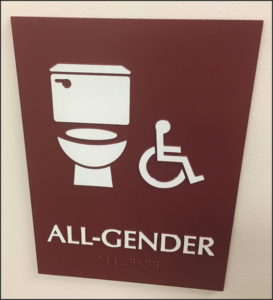The Youngkin administration has issued a new set of model policies designed to uphold the “privacy, dignity and respect” of all students and parents in Virginia public schools, replacing a policy put into effect by the Northam administration in 2021.
The new policies strike me as eminently reasonable. The guidelines make it clear that “all students have the right to attend school in an environment free from discrimination, harassment, or bullying.” As a practical matter, it looks like single-user bathrooms are the future for Virginia schools. But the guidelines also fulfill Youngkin’s promise to represent the interests of parents over educational activists and bureaucrats.
The Northam policies, states the “2022 Model Policies,” “promoted a specific viewpoint aimed at achieving cultural and social transformation in schools.” They disregarded the rights of parents and ignored legal and constitutional principles that impacted how schools educated students, including transgender students.
“The Department … fully acknowledges the rights of parents to exercise their fundamental rights granted by the Fourteenth Amendment of the U.S. Constitution to direct the care, upbringing, and education of their children,” states the model policy. “The Code of Virginia reaffirms the rights of parents to determine how their children will be raised and educated. Empowering parents is not only a fundamental right, but it is essential to improving outcomes for all children in Virginia.”
The 2022 Model Policies contains a set of guiding principles, which I will proceed to quote verbatim (with excisions noted).
Parents have the right to make decisions with respect to their children: Policies shall be drafted to safeguard parents rights with respect to their child, and to facilitate the exercise of those rights. Policies shall reflect the following commitments:
- Schools shall respect parents’ values and beliefs: Parents have the right to instill in and nurture values and beliefs for their own children and make decisions concerning their children’s education and upbringing in accordance with their customs, faith and family culture. …
- Schools shall defer to parents to make the best decisions with respect to their children: Parents are in the best position to work with their children and, where appropriate, their children’s health care providers to determine (a) what names, nicknames, and/or pronouns, if any, shall be used for their child by teachers and school staff while their child is in school, (b) whether their child engages in any counseling or social transition at school that encourages a gender that differs from their child’s sex, or (c) whether their child expresses a gender that differs with their child’s sex while at school.
- Schools shall keep parents informed about their children’s well-being. To ensure parents are able to make the best decisions with respect to their child, school personnel shall keep parents fully informed about all matters that may be reasonably expected to be important to a parent, including, and without limitation, matters related to their child’s health, and social and psychological development. …
Schools shall serve the needs of all students. The Department is committed to working with school divisions to ensure a positive, safe, and nurturing learning environment for all students. … Schools should attempt to accommodate students with distinctive needs, including any student with a persistent and sincere belief that his or her gender differs from his or her sex. A team of appropriate school staff and other caregivers should collaborate with the parents to identify and implement reasonable accommodations and modifications, taking into account the resources and staff available in school and school divisions, as well as the rights and needs of other students and of school staff. Single-user bathrooms and facilities should be made available in accessible areas and provided with appropriate signage. …
Schools shall respect all students. All children in Virginia have a right to learn, free from unlawful discrimination and harassment. School division policies shall therefore implement the requirements of the Act in a manner that ensures no student is discriminated against or harassed on the basis of his or her sex.



